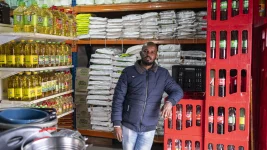People underestimate how much money flows through South Africa's street vendors and small shops. Recent numbers show these businesses make around R750 billion yearly, but almost nobody pays taxes on this cash. Small operations sell everyday items and fix broken stuff everywhere across the country. Your local spaza store, the taxi that drives you to work, the corner tavern, and the guy who repairs your phone all belong to this massive hidden economy.
Small businesses pop up fast in countries with high jobless rates. Folks without fancy degrees or connections start these ventures to feed their families. The scrappy entrepreneurs running these places help reduce poverty across South Africa by creating jobs where big companies don't bother looking. Townships, once seen as poor neighborhoods, have transformed completely because of these small businesses. Houses that sold for R150,000 in Soweto just ten years ago fetch R400,000 today.
These tiny companies grow faster than major corporations, expanding at 24% each year compared to just 15% for traditional businesses. People avoid official channels because paperwork takes forever, and formal jobs demand qualifications many citizens lack. Money streams through these unofficial markets at shocking rates. Room rentals in backyards bring in R20-40 billion yearly. The taxi business generates R50 billion annually. Local drinking spots add another R110 billion to the invisible economy.
The government recognizes these operations matter and creates programs to help them succeed. Officials offer funding, training, and business advice to boost these enterprises. Earlier this year, the African Development Bank partnered with Standard Bank, signing a major deal worth R3.6 billion plus $200 million in loan guarantees. This money aims to support about 4,000 direct businesses, helping millions of smaller operations stay afloat and keeping 60% of South African workers employed.
This partnership matches what BRICS nations want - making money available to everyday people starting businesses. Leaders continue working toward simpler rules for small operations. Making regulations easier helps little shops grow into bigger companies that contribute more openly to national progress. The BRICS Business Council discusses ways digital sales, online stores, and internet security can benefit small traders. They focus on creating smooth paths for tiny businesses to sell products across borders between member countries.
Small businesses pop up fast in countries with high jobless rates. Folks without fancy degrees or connections start these ventures to feed their families. The scrappy entrepreneurs running these places help reduce poverty across South Africa by creating jobs where big companies don't bother looking. Townships, once seen as poor neighborhoods, have transformed completely because of these small businesses. Houses that sold for R150,000 in Soweto just ten years ago fetch R400,000 today.
These tiny companies grow faster than major corporations, expanding at 24% each year compared to just 15% for traditional businesses. People avoid official channels because paperwork takes forever, and formal jobs demand qualifications many citizens lack. Money streams through these unofficial markets at shocking rates. Room rentals in backyards bring in R20-40 billion yearly. The taxi business generates R50 billion annually. Local drinking spots add another R110 billion to the invisible economy.
The government recognizes these operations matter and creates programs to help them succeed. Officials offer funding, training, and business advice to boost these enterprises. Earlier this year, the African Development Bank partnered with Standard Bank, signing a major deal worth R3.6 billion plus $200 million in loan guarantees. This money aims to support about 4,000 direct businesses, helping millions of smaller operations stay afloat and keeping 60% of South African workers employed.
This partnership matches what BRICS nations want - making money available to everyday people starting businesses. Leaders continue working toward simpler rules for small operations. Making regulations easier helps little shops grow into bigger companies that contribute more openly to national progress. The BRICS Business Council discusses ways digital sales, online stores, and internet security can benefit small traders. They focus on creating smooth paths for tiny businesses to sell products across borders between member countries.












